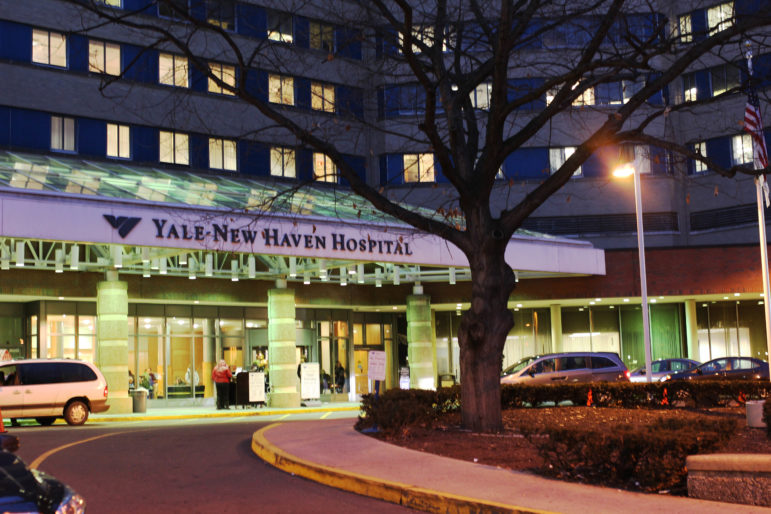Fourteen Connecticut hospitals are being penalized by the Centers for Medicare & Medicaid Services (CMS), losing 1% of their Medicare reimbursements this fiscal year for having high rates of hospital-acquired infections and injuries, new data show.
The hospitals are among 786 nationwide being penalized under the Hospital-Acquired Conditions Reduction Program, which was created under the Affordable Care Act, according to a Kaiser Health News (KHN) analysis. The program is in its sixth year and the latest Medicare reimbursement penalties are for the current fiscal year, which began in October 2019 and runs through September.
When assessing penalties, CMS considers the number of infections, blood clots, sepsis cases, pressure ulcers, and other complications that may have been prevented.

For the second year, Yale New Haven Hospital was not penalized by CMS.
The 14 hospitals losing 1% of their Medicare reimbursements are: Waterbury Hospital, Stamford Hospital, Lawrence + Memorial Hospital in New London, Johnson Memorial Hospital in Stafford Springs, Charlotte Hungerford Hospital in Torrington, Midstate Medical Center in Meriden, Middlesex Hospital, and Windham Community Memorial Hospital & Hatch Hospital in Willimantic.
Also, Hartford Hospital, St. Vincent’s Medical Center in Bridgeport, Norwalk Hospital, The Hospital of Central Connecticut in New Britain, UConn John Dempsey Hospital in Farmington and The Connecticut Hospice Inc. in Branford.
“The number [penalized] is improving; we are getting better,” said Dr. Mary Cooper, chief quality officer and senior vice president for clinical affairs at the Connecticut Hospital Association. “There’s been widespread improvement across the state. We are loving seeing the data improve, and we are hoping next year it improves more.”
“While I agree with many other advocates who feel that these penalties are too small to motivate the degree, and perhaps the type, of change needed, I do feel they raise the awareness of medical errors and avoidable harm that affects patients’ lives day in and day out.”
— Lisa Freeman
In 2019 and 2018, 15 Connecticut hospitals were penalized under the program.
Statewide, 16 facilities including Bridgeport Hospital, St. Francis Hospital & Medical Center, Greenwich Hospital, Griffin Hospital, Bristol Hospital, Danbury Hospital, Yale New Haven Hospital and Masonic HealthCare Center are not being penalized in the 2020 fiscal year.
Five hospitals have never been penalized under the program. They are Sharon Hospital, Milford Hospital, William W. Backus Hospital in Norwich, Hebrew Home and Hospital Inc. in West Hartford and Bristol Hospital.
It’s unknown how much the penalties will cost each hospital because the dollar amounts are tied to Medicare claims each will submit to the government through the end of the fiscal year.
Lisa Freeman, executive director of the Connecticut Center for Patient Safety, said, “It is discouraging, when looking at the overall numbers, to see the same story, different year once again.”
But there are some bright spots in the data, Freeman said, including that five of the hospitals not penalized this year were penalized last year. And Bridgeport Hospital, which was penalized in each of the first five years, wasn’t penalized this year, she said.
“While I agree with many other advocates who feel that these penalties are too small to motivate the degree, and perhaps the type, of change needed, I do feel they raise the awareness of medical errors and avoidable harm that affects patients’ lives day in and day out,” Freeman said. “What they don’t accomplish is motivating the deeper change in the culture surrounding health care and the importance of transparency so that the providers and systems can truly learn from, and make needed changes as a result of, treatment complications.”
Cooper said that hospitals are making concerted efforts to reduce the number of infections or injuries, including: continued implementation on “high reliability” standards; education of frontline staff about how to predict the likelihood of, and prevent, adverse events such as pressure ulcers or developing sepsis after surgeries; a focus on interprofessional care, where various members of a patient’s care team are communicating; and more involvement by hospital CEOs when it comes to learning how infections and injuries can be prevented, including CEOs completing rounds with frontline staff.
Seven hospitals are exempt from the program, including those that only serve children, veterans or psychiatric patients, as well as those deemed “critical access hospitals” due to a lack of nearby alternatives for patients, according to KHN.
In addition to these penalties, hospitals can face other fines as well. CMS announced in October that 26 of Connecticut’s 29 hospitals are being penalized this fiscal year with Medicare reimbursement reductions, of varying amounts, for having high rates of patients who were readmitted within a month of being discharged.
Correction: An earlier version of this story omitted Bristol Hospital from the list of facilities never penalized by CMS.

What this article fails to point out is that hospitals are being penalized by CMS for infections and injuries that have been reported to NHSN and through Medicare claims data anywhere from 2-4 years ago….aka old data that is not reflective of the current state of any facility! The data for hospital-acquired infections is based on rolling data between 2017 -2018 and hospital-acquired injuries are based on rolling data from 2016-2018. Hospitals are constantly behind the eight ball and playing catch-up when it comes to CMS penalty programs. To think the penalties are not stiff enough to motivate change is ludicrous, as Medicare reimbursement for inpatient claims has been dwindling each year. Hospitals have been working to improve patient safety for a long time, however, some are further along in the process than others for a variety of reasons. The reality with the CMS penalty programs is improvements in reducing infections and injuries that are achieved today will be reflected in the data in two fiscal years or more.